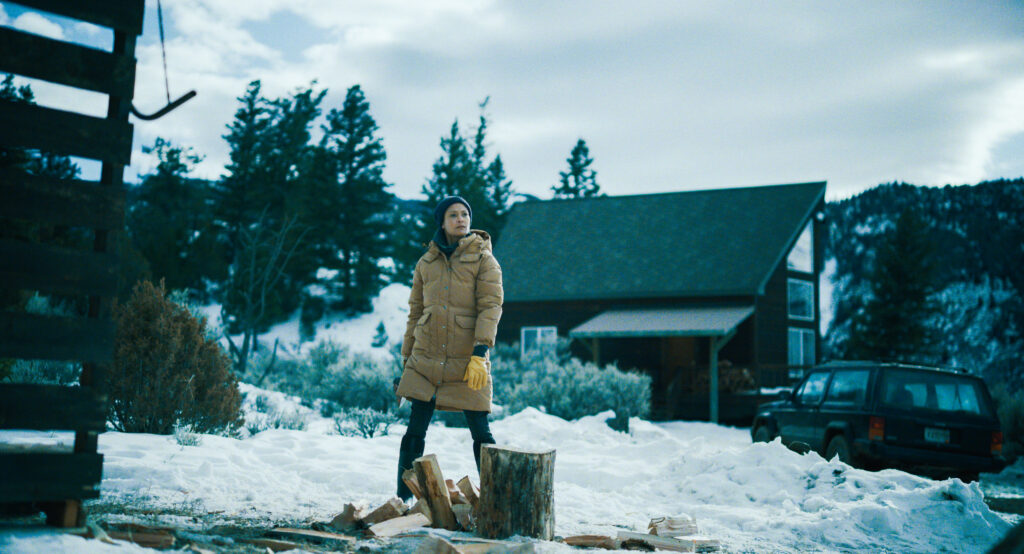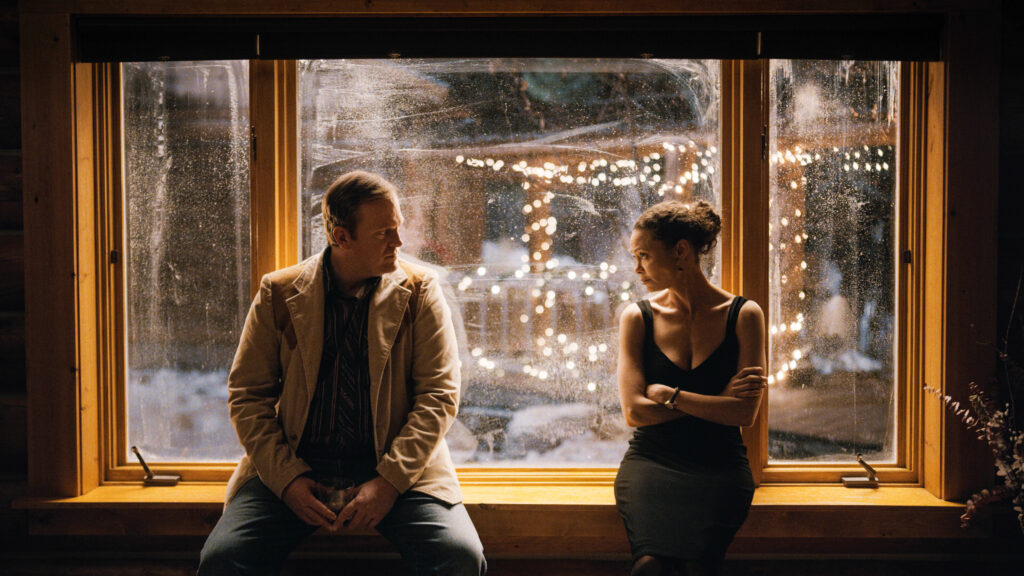March 31, 2024
by Carla Hay

Directed by Alejandro Monteverde
Some Italian with subtitles
Culture Representation: Taking place in Italy and in New York, from 1889 to 1892, the dramatic film “Cabrini” (based on true events) features an all-white cast of characters representing the working-class, middle-class and wealthy.
Culture Clash: Roman Catholic nun Frances Xavier Cabrini (also known as Mother Cabrini) experiences many obstacles when she relocates from Italy to New York City, in order to launch missionary institutions, such as an orphanage and a hospital for underprivileged people.
Culture Audience: “Cabrini” will appeal primarily to people who are interested in faith-based biopics that are formulaic but inspirational.

“Cabrini” is a little too lengthy (142 minutes), but this biopic about Frances Cabrini adeptly balances themes of religion and civil rights. It’s dependably inspirational with sturdy performances, despite the film’s frequently drab look and tone. People who are interested in this subject matter will have the most patience when the movie’s pacing tends to get sluggish. Other people who might not be interested in watching a movie about a religious historical figure can at least appreciate how “Cabrini” recreates the late 19th century, without glossing over the dark and depressing aspects of this time period.
Directed by Alejandro Monteverde and written by Rod Barr, “Cabrini” takes place from 1889 to 1892, in Italy and in New York. The movie constantly pounds viewers over the head with scenes of discrimination and oppression. Some of the dialogue is a bit hokey, but the movie realistically depicts how women and certain immigrants were treated as inferior in discrimination that was legal at the time. This bigotry causes the main obstacles that Roman Catholic nun Frances Cabrini (played by Cristiana Dell’Anna) and others experience in their charitable work.
“Cabrini” (which is told in chronological order) opens with a scene in New York City in 1889. A boy who’s about 9 or 10 years old named Paolo (played by Federico Ielapi) is on a street, as he is desperately wheeling his dying, widowed mother in a cart to a hospital. Paolo can only speak Italian, so he is dismissed or ignored by most people on the street. When he gets to the hospital, he is cruelly turned away because Paolo and his mother are Italian. Paolo mother dies as a result of not getting the medical help that she needs.
Meanwhile, at a convent in Codogno, Italy, the outspoken and determined Frances Cabrini, also known as Mother Cabrini, gets a letter summoning her to the Vatican. When she gets there, a cardinal named Silvio (played by Fausto Russo Alesi) meets with her to tell her that the Vatican has received her numerous letters requesting that she lead missions for needy people in China. The cardinal haughtily tells Mother Cabrini that her requests have been denied. He also states that called her to the Vatican only to give her the rejection in person. “Stay where you belong, Mother,” he says in a condescending tone.
Just as it looks like Mother Cabrini is about to leave, she asks if the rejection was a decision that was made by the cardinal or by Pope Leo XIII (played by Giancarlo Giannini), who just happens to be in another part of the room. The cardinal replies it doesn’t make a difference, but Mother Cabrini says that if the decision is from the Pope, she wants to hear it directly from the Pope. Before anyone can stop her, Mother Cabrini boldly strides over the Pope, introduces herself, and states why she wants to lead missions around the world, beginning in China.
Pope Leo XIII is skeptical that a woman has what it takes to be a missionary leader. He also says there’s never been an independent order of nuns to take on this task. Pope Leo XIII asks her: “Why China?” Mother Cabrini replies, “Because we’ve forgotten the East.”
After a back-and-forth discussion, the Pope Leo XIII agrees to let Mother Cabrini become a missionary leader, but he tells her that she has to start in the West, not the East. He also says that if she becomes the first woman t lead an overseas mission for the Catholic Church, it will be proof of what women can accomplish. It isn’t long before Mother Cabrini and other nuns from her convent travel to New York City, where they are assigned to Five Points Orphanage, whch has fallen on hard financial time.
The orphanage is in a low-income, crime-ridden neighborhood called Five Points, which is so dangerous, a taxi driver refuses to drive the nuns there at night. The only place where the nuns can find shelter on their first night in New York City is a brothel, thanks to the generosity of a sex worker named Vittoria (played by Romana Maggiora Vergano), who found out about the nuns’ plight when Vittoria met them on the street. Vittoria later becomes a loyal ally of the nuns in their mission.
In New York City, Mother Cabrini and her team of nuns get constant discrimination and harassment because they are women and because they are Italian. On the way to visit the Five Points Orphanage for the first time, a male stranger on the street tells the nuns to go back to where they came from, and he calls Mother Cabrini a “pig.” The nuns also quickly find out that Italians and many other people in Five Points are considered “undesirables” by the bigoted snobs in the New York area.
While in New York, Mother Cabrini has to report to Archbishop Corrigan (played by David Morse), who immediately tells her that he wants her to go back to Italy. Even though Mother Cabrini shows him a letter from Pope Leo XIII that gives her the authority to lead this mission, Archbishop Corrigan isn’t easily swayed by this letter from the Pope. “If you are to remain in New York, it’s only because I allow it,” the archbishop tells her.
Needless to say, Archbishop Corrigan and Mother Cabrini clash on several occasions over various issues. He is required by the Catholic Church to give some financial support to Mother Cabrini’s mission. But one of the ways he makes it difficult for her to raise money is he tells her that she can only solicit funds from Italians in the area. However, the Italians are among the area’s poorest residents.
Another sexist and xenophobic person in power who tries to get in Mother Cabrini’s way is New York City’s Mayor Gould (played by John Lithgow), a pompous and corrupt blowhard. At one point Mayor Gould angrily scolds Archbishop Corrigan by saying: “You let a woman push you around—an Italian woman. Is that the way you run your church?” Mayor Gould abuses his power by threatening to arrest her or by saying that he can withhold permits that Mother Cabrini needs when she has plans to build a hospital that will accept low-income immigrants and other underprivileged people.
Are there any men in this movie who aren’t sexist or mean-spirited to Mother Cabrini? Yes, but only one really gets significant screen time and dialogue: Theodore Calloway (played by Jeremy Bobb), a reporter for The New York Times, who is the first person to spread major public awareness of Mother Cabrini’s mission. When he interviews her for a New York Times article, she talks about the dismal living conditions of children in Five Points and says to him: “Even rats have it better than the children.” It’s a quote that becomes the article’s headline. It’s also an example of how Mother Cabrini is astute at winning people over to her cause and understanding the power of the media.
“Cabrini” has subplots about Vittoria and Paolo that are intended to show the brutal and violent sides of a rough neighborhood such as Five Points. Vittoria is being abused by the brothel’s pimp Geno (played by Giacomo Rocchini), who hates that she is spending time helping Mother Cabrini and the other nuns when he wants her to make money for him. Paolo goes to live in the orphanage after his mother dies, but he is emotionally troubled by the deaths of his parents. It’s later revealed that Paolo’s father committed suicide by shooting himself.
Curiously, none of the other nuns in “Cabrini” get much attention in the movie, in terms of telling viewers more about who they are. The other nuns are Sister Aurora (played by Chelsea Feltman), Sister Serafina (played by Soraïa Scicchitano), Sister Margherita (played by Sarah Santizo), and Sister Umilia (played by Eugenia Forteza), but most “Cabrini” viewers probably won’t remember their names or anything about them. These other nuns are very generic and have blank personalities. That’s probably because the “Cabrini” filmmakers wanted to make sure that Mother Cabrini remains the star attraction in this movie. Virginia Bocelli (daughter of singer Andrea Bocelli) has a small role as choir girl named Aria.
Cristiana Dell’Anna gives an admirable performance in a role that makes Mother Cabrini look gritty and resourceful when she needs to be, but never really flawed in a realistic way. And if Mother Cabrini seems to be too saintly in this movie, that’s because she became the first U.S. citizen to become a saint in the Catholic Church. Still, the movie tends to go a little overboard by not showing her having any personality imperfections like a real human being.
“Cabrini” has some pacing issues that could have been prevented with better film editing. And after a while, the movie becomes a checklist of obstacles that Mother Cabrini has to overcome, rather than showing her as a well-rounded person. Some of the characters are written as extreme contrasts of “heroes” and “villains,” and it sometimes comes across as almost like being caricatures. A little more nuance was needed for these characters’ personalities.
There’s also an earnest effort for “Cabrini” to be a female empowerment film. However, some of the dialogue is very corny in this intention. There’s a scene where Mayor Gould tells Mother Cabrini: “It’s a shame you were born a woman. You would’ve made an excellent man.” Mother Cabrini replies, “Oh no, Mr. Mayor. Men could never do what we do.”
Even though some of “Cabrini” gets bogged down by cloying mush, the movie overall serves as a good tribute to the real Mother Cabrini. She and the other characters in the movie might have some cringeworthy lines of dialogue and overly simplistic personality depictions, but these mawkish moments are overshadowed by the movie succeeding in showing her compassionate courage. And if anyone is inspired by it, that’s what matters most.
Angel Studios released “Cabrini” in U.S. cinemas on March 8, 2024.


